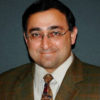| Cardiovascular Emergencies: Beyond A-B-C and ACLS |
| Mon Oct 22, 2018 - Fri Oct 26, 2018 |
| 8:00am-12:15pm |
| The Westin, Sarasota, Florida |
| SEMLA-3320181022 |
|

Presented by Amal Mattu, M.D., F.A.A.E.M., F.A.C.E.P.
Dr. Amal Mattu brings his experience in emergency cardiology to Sarasota. Before joining the Department of Emergency Medicine faculty at the University of Maryland, he completed his residency in emergency medicine at Thomas Jefferson University Hospital, as well as an emergency cardiology-focused teaching fellowship. Beyond emergency cardiology, Dr. Mattu focuses on geriatric emergency medicine, faculty development and risk management. Dr. Mattu brings a highly awarded teaching style to this American Medical Seminar. His most recent accolades include the American College of Emergency Physicians Outstanding Contributions to Education Award, the organization’s highest honor for teaching.
Presented By
Presenter
-
Amal Mattu, M.D., F.A.A.E.M., F.A.C.E.P. (Learn More)

Professor and Vice Chair of Education, Department of Emergency Medicine, University of Maryland School of Medicine
Course Outline
Day 1
Advanced ECG Workshop: Classic, Confusing, and Confounding Patterns (4 Hour Workshop)
Upon completion of this session, the participant should be able to:
- Identify subtle ECG findings in the ACS patient that predict an increased risk of morbidity and mortality.
- Distinguish between some common mimics of ACS vs findings of true ACS on the ECG.
- Identify findings in bundle branch block that help in diagnosis of ACS.
Day 2
ECG Mimics of Cardiac Ischemia
Upon completion of this session, the participant should be able to:
- Describe a simple method of distinguishing between STEMI vs. acute pericarditis.
- Distinguish between hyperkalemia and STEMI based on axis changes.
- Describe a T-wave finding in PE that mimics cardiac ischemia.
Cases That Went Bad: Learn From Our Mistakes!
Upon completion of this session, the participant should be able to:
- Identify an ECG abnormality that predicts intracranial hemorrhage.
- Identify a dangerous condition based on voltage which is often misdiagnosed as ACS or PE.
- Identify an electrocardiographic T-wave abnormality that predicts significant coronary artery disease.
Electrocardiography of Syncope
Upon completion of this session, the participant should be able to:
- List the deadly conditions which must be identified on ECG in the post-syncope patient.
- Describe two congenital conditions that predict deadly arrhythmias in the post-syncope patient.
- Identify two conditions that predict deadly arrhythmias based on assessment of the ECG intervals.
Day 3
Advanced ECG Workshop: Tough Dysrhythmias Made Easy! (4 Hour Workshop)
Upon completion of this session, the participant should be able to:
- Describe a simple series of steps to make the diagnosis of tachydysrhythmias.
- Distinguish between the various types of bradydysrhythmias and AV blocks.
- Describe the treatment protocols for stable and unstable dysrhythmias.
Day 4
Wide-Complex Tachycardias: Myths and Pitfalls
Upon completion of this session, the participant should be able to:
- Identify difficulties in distinguishing amongst various types of wide complex tachycardias.
- Describe pitfalls in the diagnosis and treatment of WPW-related tachydysrhythmias.
- List the shortcomings associated with the use of amiodarone in managing patients with wide complex tachycardias.
Low-Risk Chest Pain: A 2018 Approach
Upon completion of this session, the participant should be able to:
- Describe some common pearls and pitfalls that occur in the diagnosis of ACS.
- Review the most common accelerated diagnostic protocols for evaluating patients with suspected ACS.
- Describe a rational approach to the modern-day evaluation of low risk chest pain
STEMI and NSTE-ACS: Recent Literature Updates
Upon completion of this session, the participant should be able to:
- List newer ECG criteria that warrant acute reperfusion therapy.
- Describe the newest diagnostic strategies for ACS.
- Describe the updated treatment protocols ACS.
“Remember That Patient You Saw Last Night?” Case Reviews in Missed ACS.
Upon completion of this session, the participant should be able to:
- List high risk groups that are associated with missed ACS.
- Discuss the shortcomings of stress testing and cardiac catheterization.
- Discuss the limitations of current troponin testing.
Day 5
Winning at Failure: Optimal Management of Cardiogenic Pulmonary Edema
Upon completion of this session, the participant should be able to:
- Describe the limitations of morphine and furosemide in the management of cardiogenic pulmonary edema.
- Identify medications available for rapid preload reduction and afterload reduction.
- Discuss the use of noninvasive positive pressure ventilation.
Cooling the Fire: Modern Management of Cardiac Arrest
Upon completion of this session, the participant should be able to:
- List newest updates in Basic Life Support guidelines.
- List the newest recommendations in Advanced Life Support guidelines.
- Describe current and future trends in the management of cardiac arrest and post-arrest care.
Syncope: Simplifying a High-Risk Condition
Upon completion of this session, the participant should be able to:
- List the high-risk features in the history and physical examination that predict poor short-term outcomes.
- Describe a cost-effective workup for patients presenting after syncope.
- Distinguish between syncope and seizures.
10 Things You Must Consider in the Crashing Patient: Beyond A-B-C and ACLS
Upon completion of this session, the participant should be able to:
- Describe some pitfalls associated with commonly-used resuscitation techniques.
- Identify how basic bedside ultrasonography can help in the diagnosis and treatment of “crashing” patients.
- Discuss some of the new concepts in the recent AHA guidelines that can help…and hinder the chance of survival in “crashing” patients.
Accreditation
This program is not yet approved for CME credit.
Enjoy Sarasota with Half Day Lectures
The unique structure of this Cardiovascular Emergencies Medical Conference includes classes in advanced ECG, tachycardia, cardiac arrest and more from 8:00 am to 12:15 pm each day, leaving plenty of time to enjoy all that Sarasota has to offer. White sand beaches, destination golf courses and high-end restaurants are just a few of the ways conference attendees can spend their afternoons and evenings.
Register


